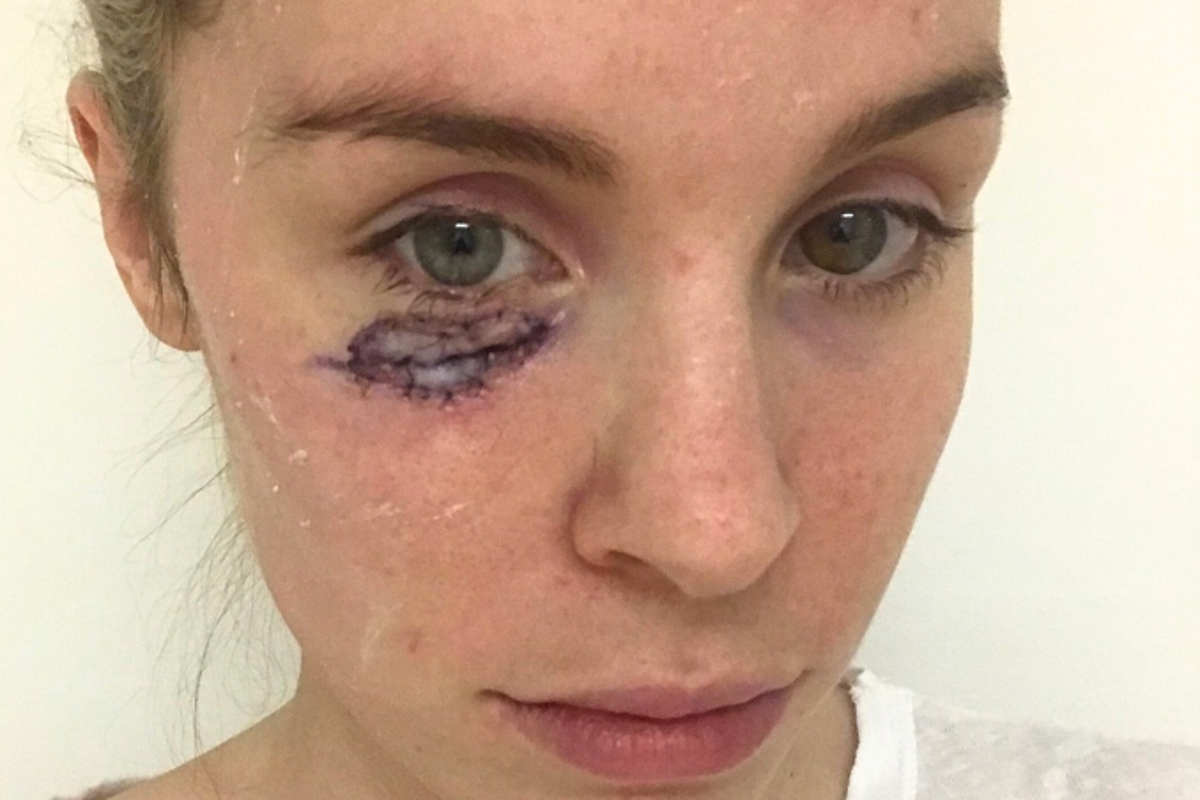It had been a normal day in the office for Jessica Zbinden-Webster, when she scratched her eye and realised her hand was covered in blood.
For months, she had been aware of a lesion on her face, but having had problematic skin during her late teens and early twenties, she had assumed it to be a blocked pore.
Yet in 2018, Ms Zbinden-Webster, from London, realised it could be something more serious after the skin fell away in her hands, and she booked a GP appointment for the following day.
“I was diagnosed on the spot,” she told The Independent. “He was an ordinary GP, not a dermatology specialist, but he could see immediately from the shape and colouration that it was basal cell carcinoma, the most common type of skin cancer.”
Then aged 26, she underwent surgery that removed her lower eyelid, after the tumour was found to be much deeper than initially expected, and required a skin graft from her inner arm as well as several laser surgeries in the following years.
“I was in complete shock. I was in my mid-twenties and the last thing I expected was a cancer diagnosis. I had no history in the family of any kind of skin cancer and I’d never used sunbeds. I was really scratching my head, figuring out how this happened to me,” she said.
She now suspects it was caused by getting burnt as a child while on family holidays, and has since learnt that damage incurred in childhood is “very potent”, with a blistering skin burn doubling your chances of catching the disease.
Upon receiving the doctor’s advice to regularly wear sunscreen, she began regularly purchasing the product and noticed the costs beginning to build up.
“I was buying so much sunscreen and I was wondering ‘is everybody spending this much? How do people living below the poverty line afford this? Is it even feasible in their budgets?’”, she said.
It was during this research that she realised that sunscreen was not classified as a medical necessity, but as a cosmetic, meaning it is taxed with a 20 per cent VAT levied on every bottle.
“I was horrified. We are paying 20 per cent more than we should for a lifesaving product. It prices households out of sunscreen and in principle sends a really damaging message on sun safety to our public health.”
Melanoma is the UK’s most rapidly-increasing type of cancer, with around 17,500 new cases every year. Skin cancer specialists at Cancer Research UK have predicted that this figure will rise to 26,500 by 2038-2040, while melanoma is currently the fifth-most common cancer.
Meanwhile, around 4,000 cases each year in England are linked with deprivation.
“The NHS spends half a billion pounds every year treating skin cancer,” she said. “We need to radically change the situation. This is a skin cancer crisis and it’s affecting thousands of people and it’s costing the taxpayer millions.”
Since launching her Change.org campaign #AXEtheSPFtax, she has received over 52,000 signatures and has had support from leading dermatologists,
Her open letter, which urges the government to reclassify sunscreen as an essential healthcare item, has been backed by prominent politicians including Reform UK leader Nigel Farage and Lib Dem leader Sir Ed Davey.
Now aged 33 and clear from cancer, she is hoping that the VAT will be scrapped during Rachel Reeves’ upcoming autumn budget, and has vowed to continue lobbying until it becomes government policy.
“The UK has more deaths linked to skin cancer than Australia, the sunshine capital of the world. They had a skin cancer crisis and the government mobilised and did something about it by getting rid of their tanning salons and removed their VAT equivalent on sunscreen.
“They have a culture of sun safety and that is what we should be emulating here in the UK. We have a skin cancer crisis that is out of control but we can turn it around.”

